by M. C. Jennings | May 14, 2018 | Academics, Alumni Spotlight, COBA Events, Current Students, Faith Infusion, Student Spotlights, Uncategorized
Meet Jonathan Rugamba, one of our newest COBA alumni. Jonathan graduated on Saturday, May 12th, with a double major in accounting and finance. After graduation, he will be returning to his hometown of Kigali, Rwanda. His goal is to build up an equity firm within the next 10 years through which he can channel as many job opportunities as possible for the people of Rwanda.
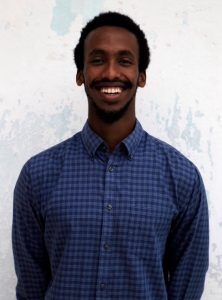
Jonathan Rugamba
Rugamba will be creating the start-up with a team of 5 of his “fellows” back home. Three of the team members build software and the other teammates will work to find clients to purchase the software. He said the start-up is still struggling to get off the ground but they hope for the best in the future. When asked how being a Christian will mold his work with co-workers and clients, Jonathan said that “I think most of my Christian values of love and unity will be vital in forming a strong team bond.”
When asked how the education and experiences at ACU and in COBA have helped him prepare for life after graduation, Jonathan stated, “Future is always the future, we can only guess at what it truly holds. We may feel prepared but we can’t certainly be sure. However, I have really gained a lot of knowledge, and that is the best preparation in my opinion. Knowledge never expires but grows.” One of Rugamba’s favorite experiences while in COBA was his time in STAR (the Student Trading and Research class) because it most mimicked the reality of the business world.
Rugamba’s advice to current students who want to follow this same type of work is to find your strength and remember that this is a never-ending journey. He advises incoming freshmen to “Have an end-in-mind, work towards it, love people and try to find the best in them. However, you are the best judge for yourself so the challenge lies in your hands. And above all strive to make sure that one day you will live your dream.”
by Hanna Roberts | Apr 2, 2018 | Academics, Current Students, Faith Infusion, Marketing, Poverty and Development, Student Spotlights, Student Spotlights, Uncategorized
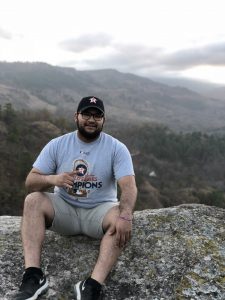
Caleb Casas, junior management and marketing major from Houston, TX.
Over spring break, the Griggs Center and Halbert Institute partnered to send a group of students led by Dodd Roberts with Dr. Sarah Easter to Honduras. The group collaborated with Mission Lazarus to work within the communities on a service trip. Caleb Casas, a junior marketing and management major from Houston, was one of the students who went and served. Part of the trip entailed meeting with small business owners to help them with current endeavors and to develop new business ideas. Led by Dr. Sarah Easter and Erika Teilmann, a junior management major from Houston, the group of students met for several weeks before their departure to learn about the business climate of the communities they would be working amidst in Honduras. They researched the businesses, resource availability, education levels, income levels, and more. The group kept it a priority to remember that they were not the experts and that they need to trust the people that actually live and work with people in those communities, the people that understand the everyday circumstances, to determine the feasibility of an idea. The students were challenged to read Philippians 2:1-8 before going into the communities to prepare a servant heart within themselves and to learn of and how to imitate Christ’s humility.
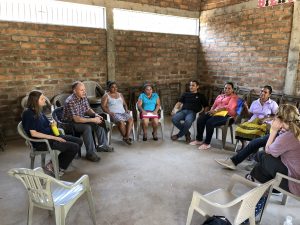 Caleb and the other students met with locals in Namasigue and Cedeño, villages in Honduras, to help build existing businesses and develop new ideas. The people talked about how they would use their businesses to help out the community: to make it possible for everyone to have a little money to buy from one another, to send kids to school, to give to the church, to employ others, and more. In the Namasigue village, all of the businesses are tied together. If only a few people operate a business, then the rest of the village would be unable to purchase from them and would force business owners to sell to ‘coyotes,’ people from bigger cities who come to purchase products in the villages at an extremely low price. It seemed to Caleb that the people had an excellent grasp of how to operate a business in the village but desired feedback on their ideas. They taught the villagers basic accounting so that they could better run their businesses by keeping accurate records, financial statements, and balancing the cost of the business. Both the students and the villagers were able to learn a lot from each other. For example, they met with a woman who planned to sell pigs and wanted to start off with ten. The group encouraged her to start off with three and to buy three pigs every few months so that she had a cycle of product and a steady stream of income instead of trying to sell all of her pigs at the same time. The group suggested that she purchase a male and female to begin breeding so that she wouldn’t have to buy pigs to resell but the women explained that the time and money it takes to breed with the resources available to her was too great for her to ever make a profit.
Caleb and the other students met with locals in Namasigue and Cedeño, villages in Honduras, to help build existing businesses and develop new ideas. The people talked about how they would use their businesses to help out the community: to make it possible for everyone to have a little money to buy from one another, to send kids to school, to give to the church, to employ others, and more. In the Namasigue village, all of the businesses are tied together. If only a few people operate a business, then the rest of the village would be unable to purchase from them and would force business owners to sell to ‘coyotes,’ people from bigger cities who come to purchase products in the villages at an extremely low price. It seemed to Caleb that the people had an excellent grasp of how to operate a business in the village but desired feedback on their ideas. They taught the villagers basic accounting so that they could better run their businesses by keeping accurate records, financial statements, and balancing the cost of the business. Both the students and the villagers were able to learn a lot from each other. For example, they met with a woman who planned to sell pigs and wanted to start off with ten. The group encouraged her to start off with three and to buy three pigs every few months so that she had a cycle of product and a steady stream of income instead of trying to sell all of her pigs at the same time. The group suggested that she purchase a male and female to begin breeding so that she wouldn’t have to buy pigs to resell but the women explained that the time and money it takes to breed with the resources available to her was too great for her to ever make a profit.
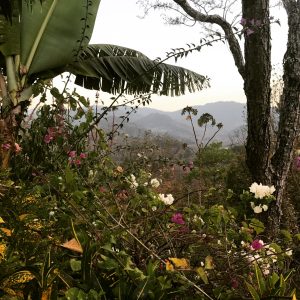 The students also built latrines in the villages as a part of Mission Lazarus’ public health campaigns that aim to engage the community through health promotion and prevention and share essential health teachings with families and communities. The latrines were a tremendous step in both sanitation and privacy for families in the communities. Caleb was struck by how something as small as a latch on a bathroom door gave people basic human dignity. “In America, we don’t have to ever worry about finding a private bathroom to use no matter where we go,” said Caleb. “But the simple act of installing a two-dollar latch allowed these people to go about their business in private and gave them dignity. There was a man who had gone over eighty years without a private bathroom and I was struck by how often I take something like a toilet for granted.” Caleb was also moved by the Hondurans’ gratitude and willingness to work. “They didn’t want us to do the work for them but wanted to work alongside us,” he noted. For the families to even receive a latrine, they had to dig the hole themselves before people would come install the physical latrine. For some people, this meant digging a twelve-foot hole with nothing but a shovel and a chisel. One man chiseled through two feet of solid rock alone. Even though they had done all of this back-breaking work to lay the foundation for the latrines, when the students came to install them, the villagers worked alongside them, helping mix and lay concrete, drilling, and installing the roof. After they had finished installing one of the latrines, a man came and gave them mangoes, which was all he had to give. Caleb was amazed that the people were so grateful that they were willing to give up all that they had to say thank you to the students.
The students also built latrines in the villages as a part of Mission Lazarus’ public health campaigns that aim to engage the community through health promotion and prevention and share essential health teachings with families and communities. The latrines were a tremendous step in both sanitation and privacy for families in the communities. Caleb was struck by how something as small as a latch on a bathroom door gave people basic human dignity. “In America, we don’t have to ever worry about finding a private bathroom to use no matter where we go,” said Caleb. “But the simple act of installing a two-dollar latch allowed these people to go about their business in private and gave them dignity. There was a man who had gone over eighty years without a private bathroom and I was struck by how often I take something like a toilet for granted.” Caleb was also moved by the Hondurans’ gratitude and willingness to work. “They didn’t want us to do the work for them but wanted to work alongside us,” he noted. For the families to even receive a latrine, they had to dig the hole themselves before people would come install the physical latrine. For some people, this meant digging a twelve-foot hole with nothing but a shovel and a chisel. One man chiseled through two feet of solid rock alone. Even though they had done all of this back-breaking work to lay the foundation for the latrines, when the students came to install them, the villagers worked alongside them, helping mix and lay concrete, drilling, and installing the roof. After they had finished installing one of the latrines, a man came and gave them mangoes, which was all he had to give. Caleb was amazed that the people were so grateful that they were willing to give up all that they had to say thank you to the students.
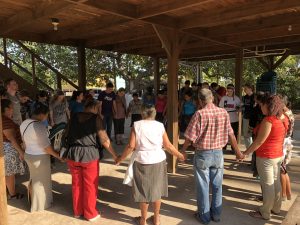 In Honduras, Caleb experienced and was impacted by was God’s purpose and design in bringing us to a specific time and place. Caleb’s grandfather was a pastor in Mexico but came to the US to start a Spanish-speaking congregation within Bammel Church in Houston. Caleb remembered hearing stories about his grandma growing up in Saltillo – no running water, an outhouse that was a mile away, playing soccer with rocks – and realized that, if it had not been for his grandfather saying “yes” to the Lord and leaving his work in Mexico, Caleb could have been in a similar situation to the people he was serving in Honduras. “I was serving what could have been my grandpa,” Caleb realized. “Maybe in three generations, like my family, those people could be in America or helping grow Honduras. You never know what impact you or God will have on people and their life trajectory.”
In Honduras, Caleb experienced and was impacted by was God’s purpose and design in bringing us to a specific time and place. Caleb’s grandfather was a pastor in Mexico but came to the US to start a Spanish-speaking congregation within Bammel Church in Houston. Caleb remembered hearing stories about his grandma growing up in Saltillo – no running water, an outhouse that was a mile away, playing soccer with rocks – and realized that, if it had not been for his grandfather saying “yes” to the Lord and leaving his work in Mexico, Caleb could have been in a similar situation to the people he was serving in Honduras. “I was serving what could have been my grandpa,” Caleb realized. “Maybe in three generations, like my family, those people could be in America or helping grow Honduras. You never know what impact you or God will have on people and their life trajectory.”
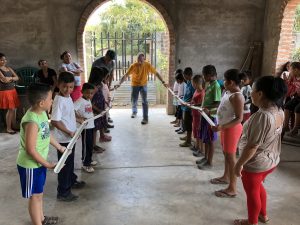 Another surreal moment that Caleb experienced in Honduras was meeting Luis, the preacher of the Honduran church the group was working with. Luis was born in Honduras but moved to the US and actually attended Caleb’s Bammel. Bammel Church sponsored Luis to attend the Baxter Institute, a seminary school in Guatemala. Caleb’s grandfather also taught classes at Baxter during Luis’ time there. Once Luis graduated, he had twenty-three churches where he could have served but felt a calling to go to Namasigue. Caleb was amazed at how God brought them together and connected them at this specific time and place where they were both serving together. “There were so many points in our lives where things could have happened differently,” Caleb said. “Nonetheless, God intersected our lives and that made an impact on me.”
Another surreal moment that Caleb experienced in Honduras was meeting Luis, the preacher of the Honduran church the group was working with. Luis was born in Honduras but moved to the US and actually attended Caleb’s Bammel. Bammel Church sponsored Luis to attend the Baxter Institute, a seminary school in Guatemala. Caleb’s grandfather also taught classes at Baxter during Luis’ time there. Once Luis graduated, he had twenty-three churches where he could have served but felt a calling to go to Namasigue. Caleb was amazed at how God brought them together and connected them at this specific time and place where they were both serving together. “There were so many points in our lives where things could have happened differently,” Caleb said. “Nonetheless, God intersected our lives and that made an impact on me.”
Caleb was absolutely impacted during his time in Honduras. The opportunity to serve and work alongside the people in Namasigue and Cedeño showed him how God works in incredible and mind-blowing ways and His plan is always good. Caleb looks forward to the potential to return to Honduras soon and is even talking about going back this summer.
by Hanna Roberts | Sep 18, 2017 | Academics, COBA Events, Poverty and Development, Social Entrepreneurship, Student Spotlights, Uncategorized
Casey McMullin is a senior financial management major from Colorado Springs, Colorado. This summer, Casey traveled around the world interning and studying abroad. He visited countries in Africa and Asia. Casey returned to Abilene with a changed perspective, new skills, and many stories.
Q: Where did you go and what did you do in Africa?
A: I went to Arusha, Tanzania. It was two hours from Mt. Kilimanjaro, which was amazing to see every morning when we woke up. We were based at Neema Village, where they house 40 babies and at-risk or abandoned children. I helped start a microfinance program so that local mothers can start businesses for additional income.
-

-
Casey with children in Neema Village
-

-
Casey with a child in Tanzania.
Q: Did working with microfinance in Tanzania change your perspective on business?
A: I think that the most challenging part was the difference between Tanzanian and American business and legal environments. When we were building the microfinance program, we had to do everything in accordance with American not-for-profit laws and Tanzanian laws so that they could get loans. A better understanding of business law would have helped.
The nature of business was very different in Tanzania. It was very simple. I had to go back to the foundations and teach the locals so that they could understand what we were doing. At the same time, I had to maintain the financial complexities I had learned so as to ensure that the program would function properly and long past our departure.
Q: What was the most impactful interaction you had with a local?
A: I think that the coolest thing that happened to me happened at the very end of our time in Africa. We only did one test run of a business since it took a long time to set up. We were working with a woman who started a chicken business. We helped her get funding for a bigger coop, food, and medicine for the chickens. On our last day, we were saying goodbye and hugging her. She gave us eggs and then ran to chop down her whole sugar cane. We told her not to, but she cut it down regardless and gave it to us as a thank you.
-

-
Casey and Lexi Koon, junior, with the woman who started a chicken business.
-
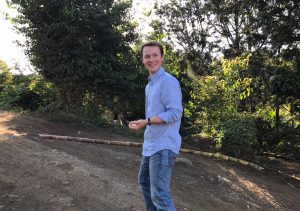
-
Casey with the sugar cane that the woman gave in gratitude.
Q: Where did you go and what did you do in China?
A: We were based in Shanghai and also traveled to Beijing and Hong Kong on the weekends. I took a crash course in basic principles of entrepreneurship and Chinese principles of entrepreneurship. We examined
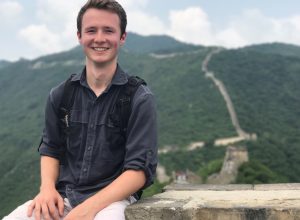
Casey sitting on the Great Wall of China.
the different opportunities to and ways of starting a company in China, visited start-ups, and talked with a number of entrepreneurs, both natives, and expatriates.
Q: What was different about studying business in another country?
A: One thing that struck me was the sheer size of China. The massive populations changed the way they did business in ways I didn’t think about. It was also interesting to see similar priorities between us as well as what each country values more. For example, the Chinese emphasize education starting at a young age and it was interesting to see how that affected business and the way people were.
Q: Did you have a big culture shock moment?
A: Oh yeah. After spending 8 weeks in Africa where there are no Chinese people, we were shocked as soon as we stepped off the plane. There were so many people walking around and they all seemed so busy. There was a class of 30 kids running around and yelling at each other in Chinese and the only thing we could think was “we are in China.”
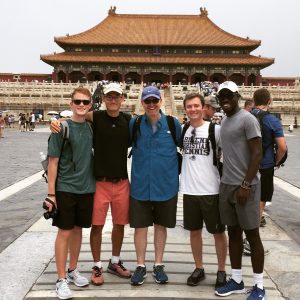
Nicholas Weirzbach, Steven Yang, Dr. Andrew Little, Casey, and Jack Oduro smile in front of the Forbidden City.
Q: Compared to interning, how was study abroad different when it came to cultural immersion?
A: In Africa, I felt like I needed to immerse myself a lot more. I think that this was because I was there to help other people rather than studying for my own benefit. Being there for others drove me to learn the language and immerse myself more since I was not there for myself.
Q: Overall, what was your biggest takeaway from this summer?
A: Take any risk. This summer, I saw just how much people live with nothing. I think that the fear of losing something can hold people back, but that is a mindset that you just can’t live with. You should be doing what you love. Look for an outcome rather than a consequence.
by M. C. Jennings | Aug 2, 2017 | Academics, Careers In..., Current Students, Student Spotlights, Student Spotlights, Uncategorized
Brandon Gonzales is a senior Accounting major from Rowlett, Texas. He is interning with Concho Resources this summer.
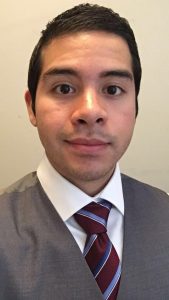
Brandon Gonzales
Q: What have you done in your internship so far?
I am currently interning at Concho Resources which is an oil and gas E&P company based in Midland, Texas. As an accounting intern, I was placed in the revenue department where I was assigned a summer project that I worked on throughout the internship. My project was to perform a self-audit of the severance taxes for oil and gas that Concho paid for its New Mexico wells. If you intern at Concho, you will be assigned a major project associated with the department you are placed in at the start of the summer. At the conclusion of the internship, you will lead a presentation over the results of your project to the upper-management of the company. Due to its importance, my first month of the summer was solely dedicated to working closely with my mentor on this project. This is because each project is over an issue that Concho has an interest in and a majority of the work done by the interns are put to use by the company. For example, the workbook that I created for my project can be directly adapted for future use by the revenue department in performing audits for years outside of the scope I was assigned. After the first month, I was rotated for the remainder of the summer among other departments and groups so I could get more exposure to accounting in the company. I moved to another floor and started working alongside the Director of Accounting and a senior accountant where I helped analyze reserve reports that we received over our properties. My main job on that project was to identify and represent key information that they wanted to review in a future meeting. I created a number of pivot tables and other charts compiled from the data in reports. After a few days, I was moved once again and began working in the Joint-Interest Billing department. There I performed another audit, but this time it was over joint operating agreements that we had from previous years. I was tasked with researching each agreement to determine if we were correctly paying what the contract stated by comparing what we had in our records. Currently, I am still in the JIB department, but am now working with another group to review unbilled properties and the accompanying invoices to determine if they are correctly billed in the revenue system we use.
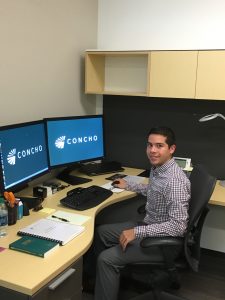
Q: What has been your favorite part of the internship?
My favorite part of the internship so far must be how involved Concho is in making sure the intern class is enjoying the summer in Midland. They want to be sure that we come away from this internship with positive memories of not only the company, but the city as well. There were multiple events throughout the summer that Concho orchestrated for the interns to get together and everything was always paid for by the company. From minor league baseball games in the company’s private box suite to golfing at the country club. They even sent us to Midland’s Petroleum Museum for a day of training so the interns could get a better sense of the oil and gas industry. The coolest event being a field trip out to one of the oil rigs where we received a personal tour from one of the supervisors. Concho also provided summer housing for the interns which really helped in bringing everyone together since we all literally lived doors down from each other. Even when there was not a company sponsored event, the interns usually had something planned like a cookout at the apartment pool.
Q: How do you see this experience aiding you in the future?
Going into this internship, I knew nothing about the oil and gas industry including how accounting was done for E&P companies. However, I was never given any busy work this summer. All the projects I worked on were assignments that would be given to the regular staff and provided an actual benefit to the company. Being treated as another new-hire was worthwhile and the knowledge that I gained can easily be leveraged in the future if I decide to pursue a career in the industry. Getting to know the people I worked with was one of the biggest benefits that I gained from this internship. I’ve built relationships with multiple people over the summer who gave me guidance not only in my career, but life as well. In particular, one coworker welcomed me into her church and got me connected with the youth group she ran. Even if I never work at Concho or in the oil and gas industry, building relationships with more experienced people in the field was a great experience.
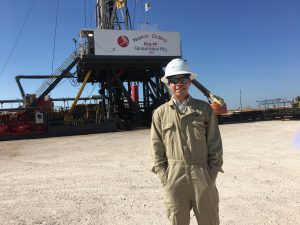
Q: What has grown you as an individual the most in this internship?
I’ve always been the type of person who likes to figure out solutions to problems I come across on my own. With this internship, I had to learn to be more proactive in asking for assistance from not only those who I worked directly with, but others within the company. I knew almost nothing whenever I started a new project and at times that was daunting. Repeatedly needing to ask for further explanations was something that I was uncomfortable with because I didn’t want to be a bother. Over time, I came to realize that being given more responsibilities didn’t mean that I had to bear everything alone. Looking around the office, I noticed that it was common to see people collaborating on their work. Although people had separate responsibilities, we were all part of the same team. This environment helped me get used to working as a part of a larger team and not be afraid to ask for further clarification on what I was doing. People welcomed questions because they wanted to make sure I understood not only how something was done, but the why as well.
Q: Do you have any tips for others?
Audit or Tax? Big 4 or mid-tier firm? These are common questions that accounting majors come across at some point in undergrad. Some students find their own answer within weeks, while others are unsure up until graduation. However, when it comes to starting their career, I think that many accounting students are too quick to dismiss starting out their career in an industry role. Going into public accounting straight out of college is seen as the traditional route with securing a great job in industry after years of experience as the end goal. I think this is due in large part to the fact that many of the companies that recruit on campus are public firms. There is little exposure to any other option before graduation. This summer, many of the staff that I worked alongside did do not come from public backgrounds and I was curious as to why. I received various answers, but the most common was that the long-term goals they had for themselves were perfectly attainable without going into public accounting. The main takeaway being that both routes have their pros and cons so it is up to the individual to decide which path is best for them. I would encourage younger students to equally give both options their attention as they go through college. Choosing to dismiss one side without the proper due diligence is simply closing off a number of future opportunities.
by M. C. Jennings | Jul 24, 2017 | Academics, Current Students, Faith Infusion, Student Spotlights, Uncategorized
McKinley Terry is a senior Management major with minors in English and History from Longview, Texas. He is interning at Alpine Church of Christ in Longview, TX as the youth ministry summer intern.
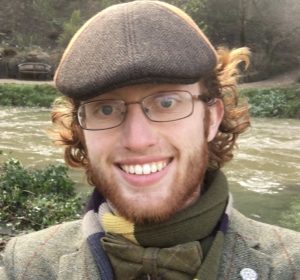
McKinley Terry
Q: What have you done in your internship so far?
So far, I have helped lead classes for middle schoolers and high schoolers in our youth group, organized mission trips and social events, and helped our students better serve others throughout their community and the state of Texas.
Q: What has been your favorite part of the internship?
My favorite part was definitely our recent mission trip to Camp of the Hills in Marble Falls, Texas. We served nearly four thousand meals that week to campers brought in by faith and community-oriented groups throughout Texas. I always loved going on this mission trip when I was in the youth group, so it was incredible to get to serve again as a leader and motivate our students to serve others.

Q: How do you see this experience aiding you in the future?
My goal is to eventually teach at the university level, so working with young adults has helped me to understand the difficulties and opportunities in reaching and mentoring them.
Q: What has grown you as an individual the most in this internship?
I have seen first-hand the difficulties that non-profits such as churches face regarding operations, budgeting, and management. Having to balance the interests and management styles of separate individuals has helped me learn how to navigate what can often be chaotic situations without growing too frustrated and inefficient.
by M. C. Jennings | Jul 12, 2017 | Academics, Careers In..., Current Students, Student Spotlights, Student Spotlights, Uncategorized
Leah Montgomery is a senior Marketing/Management double major from Abilene, Texas. This summer, Leah is interning with PFSweb.
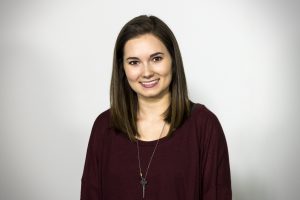
Leah has a marketing internship this summer with PFSweb, a leading global eCommerce solutions provider.
Q: What have you done in your internship so far?
A: The main two tasks I have been working on so far are the planning of a company event and writing a blog. Along with this I help the marketing team with any projects they are working on.
Q: What has been your favorite part of the internship?
A: I’ve really enjoyed seeing the process different projects have to go through before completion. Many events and publications seem very simple from the outside but on the creation side the complexity is impressive. By watching how a team can work together to get a job done shows how important every detail is.
Q: How do you see this experience aiding you in the future?
A: This internship has shown me how important group projects are. I know, everyone dislikes group projects but that is what we should expect after we graduate: never ending group projects. They are obviously different than in classes but the aspect of working as a team to achieve the same goal is the same.
Q: What has grown you as an individual the most in this internship?
A: Writing the blog has been the most challenging. I have never written a blog before, and haven’t needed to write a paper in college for over a year. Trying to make a topic in eCommerce exciting and worth reading was difficult. The original draft looks nothing like what is published, but with the help of a team of great writers I was able to get advice and edits that helped me understand more of what was expected and how I can improve and do better next time.
Q: Do you have any tips for others?
A: If Jennifer Golden ever teaches digital marketing ever again TAKE IT. That is the most obvious example of a class that I could pull information from directly and place it into my internship. Even as simple as knowing terms and understanding more about eCommerce so I could join conversations and understand what was being discussed. By knowing the information taught in that class I had more confidence going into my internship and feeling more prepared. Great class.
Check out Leah’s blog post for PFSweb here.


 Caleb and the other students met with locals in Namasigue and Cedeño, villages in Honduras, to help build existing businesses and develop new ideas. The people talked about how they would use their businesses to help out the community: to make it possible for everyone to have a little money to buy from one another, to send kids to school, to give to the church, to employ others, and more. In the Namasigue village, all of the businesses are tied together. If only a few people operate a business, then the rest of the village would be unable to purchase from them and would force business owners to sell to ‘coyotes,’ people from bigger cities who come to purchase products in the villages at an extremely low price. It seemed to Caleb that the people had an excellent grasp of how to operate a business in the village but desired feedback on their ideas. They taught the villagers basic accounting so that they could better run their businesses by keeping accurate records, financial statements, and balancing the cost of the business. Both the students and the villagers were able to learn a lot from each other. For example, they met with a woman who planned to sell pigs and wanted to start off with ten. The group encouraged her to start off with three and to buy three pigs every few months so that she had a cycle of product and a steady stream of income instead of trying to sell all of her pigs at the same time. The group suggested that she purchase a male and female to begin breeding so that she wouldn’t have to buy pigs to resell but the women explained that the time and money it takes to breed with the resources available to her was too great for her to ever make a profit.
Caleb and the other students met with locals in Namasigue and Cedeño, villages in Honduras, to help build existing businesses and develop new ideas. The people talked about how they would use their businesses to help out the community: to make it possible for everyone to have a little money to buy from one another, to send kids to school, to give to the church, to employ others, and more. In the Namasigue village, all of the businesses are tied together. If only a few people operate a business, then the rest of the village would be unable to purchase from them and would force business owners to sell to ‘coyotes,’ people from bigger cities who come to purchase products in the villages at an extremely low price. It seemed to Caleb that the people had an excellent grasp of how to operate a business in the village but desired feedback on their ideas. They taught the villagers basic accounting so that they could better run their businesses by keeping accurate records, financial statements, and balancing the cost of the business. Both the students and the villagers were able to learn a lot from each other. For example, they met with a woman who planned to sell pigs and wanted to start off with ten. The group encouraged her to start off with three and to buy three pigs every few months so that she had a cycle of product and a steady stream of income instead of trying to sell all of her pigs at the same time. The group suggested that she purchase a male and female to begin breeding so that she wouldn’t have to buy pigs to resell but the women explained that the time and money it takes to breed with the resources available to her was too great for her to ever make a profit. The students also built latrines in the villages as a part of Mission Lazarus’
The students also built latrines in the villages as a part of Mission Lazarus’  In Honduras, Caleb experienced and was impacted by was God’s purpose and design in bringing us to a specific time and place. Caleb’s grandfather was a pastor in Mexico but came to the US to start a Spanish-speaking congregation within
In Honduras, Caleb experienced and was impacted by was God’s purpose and design in bringing us to a specific time and place. Caleb’s grandfather was a pastor in Mexico but came to the US to start a Spanish-speaking congregation within  Another surreal moment that Caleb experienced in Honduras was meeting Luis, the preacher of the Honduran church the group was working with. Luis was born in Honduras but moved to the US and actually attended Caleb’s Bammel. Bammel Church sponsored Luis to attend the Baxter Institute, a seminary school in Guatemala. Caleb’s grandfather also taught classes at Baxter during Luis’ time there. Once Luis graduated, he had twenty-three churches where he could have served but felt a calling to go to Namasigue. Caleb was amazed at how God brought them together and connected them at this specific time and place where they were both serving together. “There were so many points in our lives where things could have happened differently,” Caleb said. “Nonetheless, God intersected our lives and that made an impact on me.”
Another surreal moment that Caleb experienced in Honduras was meeting Luis, the preacher of the Honduran church the group was working with. Luis was born in Honduras but moved to the US and actually attended Caleb’s Bammel. Bammel Church sponsored Luis to attend the Baxter Institute, a seminary school in Guatemala. Caleb’s grandfather also taught classes at Baxter during Luis’ time there. Once Luis graduated, he had twenty-three churches where he could have served but felt a calling to go to Namasigue. Caleb was amazed at how God brought them together and connected them at this specific time and place where they were both serving together. “There were so many points in our lives where things could have happened differently,” Caleb said. “Nonetheless, God intersected our lives and that made an impact on me.”











